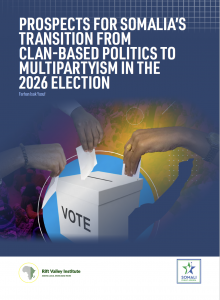EXECUTIVE SUMMARY
This paper explores the possibilities of Somalia’s transition from a clan-based system of the allocation of political authority to multipartyism. In so doing, the paper adopted qualitiative methods of data collection and analysis. The paper shows that a transition to multiparty based elections in 2026 still remains a distant dream, owing to a critical lack of the legislation and institutions needed for this to happen. The legislation missing includes that required for a new electoral model, as well as for citizenship, civil registration, a constitutional court, anti-corruption measures and campaign financing. As it stands in early 2024, the provisional constitution remains unfinalized, making the prospect of putting a new constitution in place in time for the 2026 elections less likely. Challenges, such as insecurity, a lack of political will, inadequate financing, the lack of civic education and the continuation of squabbles between Somalia’s federal government and its constituent member states continue to frustrate a transition towards multiparty-based elections. Hence, this paper recommends that the Federal Government of Somalia accelerate its finalizing of the provisional constitution —a move key to overcoming the many challenges arising from its current incomplete state— and embark on legislative reforms in the areas, such as citizenship, mentioned above. Furthermore, the federal government and its constituent units should prioritize the holding of local level elections to set the stage for multiparty-based elections at the national level.
Acknowledgements
This report has been published as a result of Farhan’s training in the Rift Valley Institute’s (RVI) Research Communities of Practice (RCoP) project. The paper therefore reflects the views of the author and not those or the position of the Rift Valley Institute. The RCoP is one of the RVI’s flagship projects that supports the professional development of early career scholars in east and central Africa through training, mentorship and dissemination of research outputs. Building on RVI’s long-term experience and presence in the region, the RCoP is a value-driven project that is built around a community of practitioners and academics with a common interest in the professional development of early career researchers. With funding from the Carnegie Corporation in New York, USA, and in partnership with the Open Society University Network-Hub for Connected Learning Initiatives, the RVI trained 27 early career scholars from Somalia, Somaliland, Ethiopia, the Democratic Republic of Congo (DRC), South Sudan and Kakuma refugee camp in Kenya in the first and second phases of the RCoP project between August 2022 and January 2024.
This report was edited by Catherine Rosemary Bond.
The Author
Farhan Isak Yusuf is Deputy Director and the Director of Center for Learning and Development at Somali Public Agenda (SPA). Farhan earned his BA and MSc in Political Science from Mogadishu University, Somalia, and Omdurman University in Khartoum, respectively. His major research interests include post-conflict state building, good governance, state and nation building.



